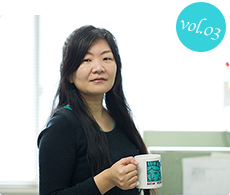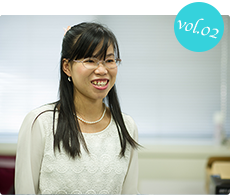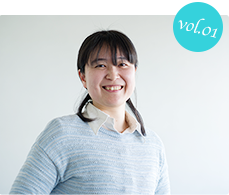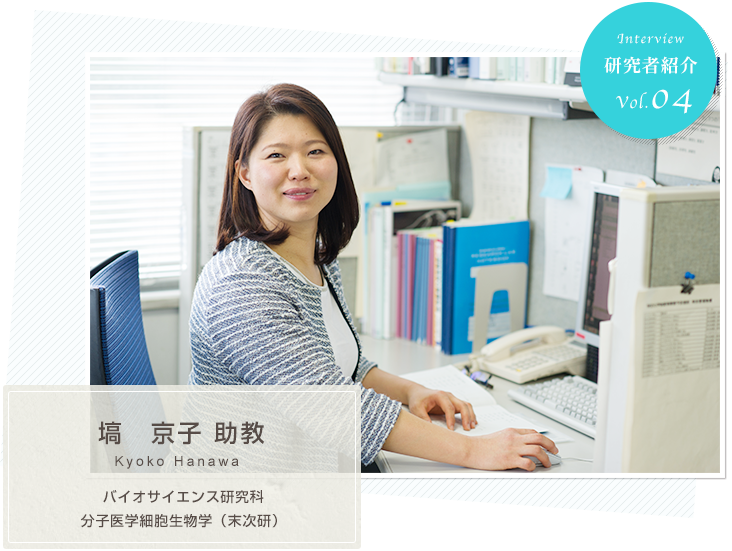
![]()
Completed doctoral studies in March 2002. D. in agriculture. Specialized in Biochemistry and Structural Biology. Took maternity leave from 2006 to 2007.
Why did you become a researcher?
Looking back, a free research project I did in my sophomore biology class in high school set me on the path to becoming a researcher. I chose the heart as my topic and worked in a group of three with other students. The mother of one of our group was a doctor and took the initiative for our research. With official permission, she prepared the entire upper part of the pig's internal organs, including the heart and lungs, and dissected them, explaining how complicated the heart and lungs are. On Sunday, we were invited to the hospital, where the pathologist allowed us to observe how pathology slides are made and also showed us human cells. At that time, I was really impressed: "What an amazing functional beauty the human body possesses. I was really impressed. At the same time, my grandfather had been diagnosed with cancer, and I really wanted to do cancer-related research. And now I am actually doing research related to cancer invasion and metastasis.
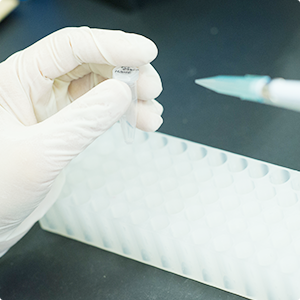
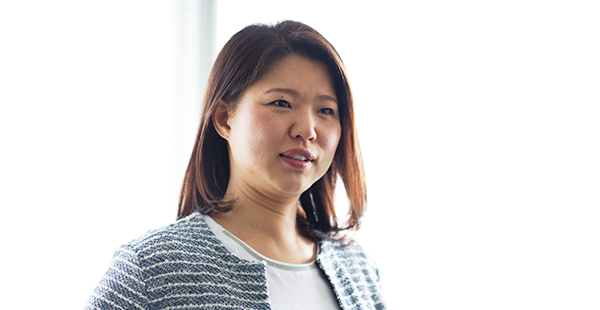
Research and parenting
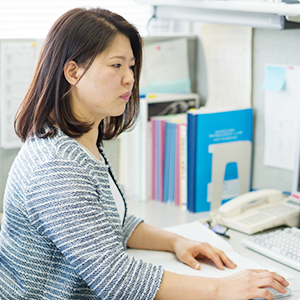
In university, I did research on small RNA molecules and graduated. Immediately after receiving my Ph.D., I had the opportunity to work at the then Genomic Sciences Research Center at RIKEN. Nearly 70% of the people involved in the projects I worked on were women, and the team leaders and group leaders of my immediate supervisors were all women. As a female researcher, I was sometimes asked if I had any role models, but I never thought of anyone in particular as a role model because all of these female researchers at RIKEN led very different lives: some were raising children, some were single, and all were very different from each other. My boss at the time was about 42 years old and was having her third child.
I gave birth to my first child while working at RIKEN. After the birth, the child's health remained poor for a long time. When the child was about to turn one year old, I told my boss that considering the totality of the situation at that time, I had no choice but to resign from my position, even though the child had settled down to the point where he could go to daycare. My boss responded, "What are you talking about? In this day and age, I've never heard of anyone foolishly quitting to raise a child. It is only natural for you to return to work. He told me, "It's only natural for you to come back. And with his great consideration, I was able to make a comeback. However, at that time it was a two-hour drive each way from my home to my job. So, with a lot of help from my mother-in-law, not to mention the understanding of my workplace, there were times when my husband would pick up the kids from daycare, feed them dinner, and then I would come home and take over, and he would go back to work and come home in the middle of the night.
I was determined to get results, write a paper, and finish the project since I had been allowed to return to work with such understanding, but at that time I was still in and out of the hospital with a child who was in and out of the hospital repeatedly, and things did not always go as planned. But each time my husband and mentor told me, "Well, never give up. I think there was a time when I put my worries aside and just thought about doing the work in front of me.
Then came the Great East Japan Earthquake. I wondered what would happen to my children if the next big earthquake struck while my husband was on a business trip at his workplace far from home, and as I walked home for hours through the city that was pitch black due to a power outage, I thought about what would happen to my children, which made me rethink my career. After working at the University of Tokyo for two years, I accepted a position at the University of Tokyo.
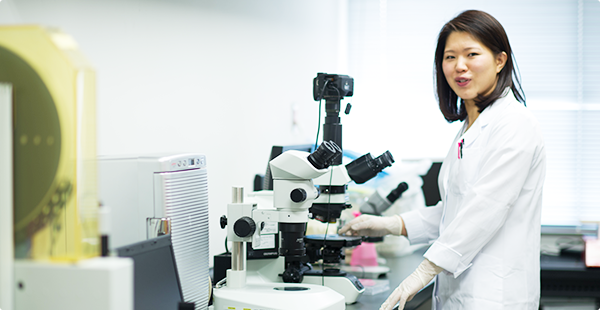
Balancing research with childcare and housework
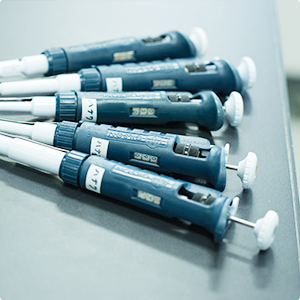
When I wake up in the morning, the first thing I do is make breakfast. While having breakfast with my husband and my child, who is now in the third grade of elementary school and is in excellent health, we all review each other's family plans for the day, focusing on the child's schedule, and then I send the child off. Many days my child goes to cram school, and on those days I have to make sure he or she has a packed lunch for dinner. So I go to work after preparing the children's lunches and dinners according to the family's schedule for the day.
On days when there is a cram school, I pick up the kids from the daycare and take them to the cram school. I immediately return to the lab, work until the cram school ends, and then pick them up from the cram school. When I get home, I have dinner and listen to my children's stories. In addition to my work and my children, I also volunteer to read to the children at the elementary school in the early morning and work with the elementary school's PTA and the local children's association on a rotating basis. We keep track of each other's schedules and work together to get through each day.
What do you tell students who want to become researchers?
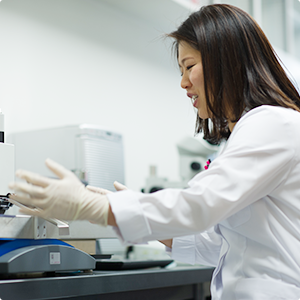
I often tell high school students who visit our university, "Everything you learn in school and in textbooks is important. I tell them that they should study all subjects as much as possible, not just the ones for the entrance exam. This is because we believe that the more knowledge you have, the greater your potential to live a better life.
Of course, there are individual differences, but I believe that being interested in something often starts with being interested in it because you know it and by knowing it. Without knowledge and interest, even if something is right in front of us, it may go unnoticed and we may not even find it enjoyable or interesting. So if you want to live a more enjoyable and interesting life, I would say study first. Life will be more fun, I would say.
Of course, studying is fun, but it can also be very hard, because the word "study" means "to study hard. But sometimes ignorance can lead to fear and unhappiness. For example, nowadays there are many diseases that we are not afraid of, but that is because we know that they can be cured. In this sense, we have no choice but to study. Even though it is hard work, studying is worth it. That is what I want to tell students, regardless of gender.
If you ask me if I have ever felt that I have been treated unfairly because I am a woman, I myself have come so far without being forced to think deeply about such things. In the world of science, where I am based, there are no "Mr." or "Mrs." authors, and there is no distinction between country of origin, age, professor, or graduate student. In that sense, I think being a researcher is much more liberal than other professions. The more capable the scientists around us, the less they talk about whether they are male or female. In fact, I have been surrounded by many excellent female scientists in leadership positions, and all of them are clearly very talented and respected people, regardless of gender. A scientist who does her job well is not a man or a woman, she is just a scientist.
(March, 2017)
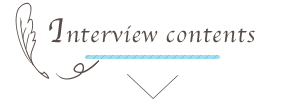
-
2017.3 updated
Division of Biological Science
-
2017.3 updated
Division of Information Science
-
2017.3 updated
Division of Biological Science






